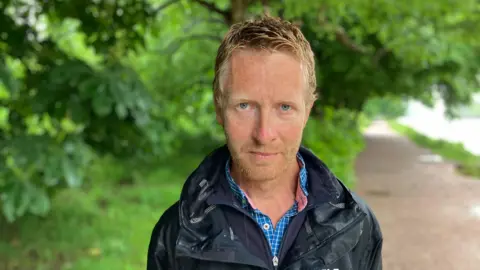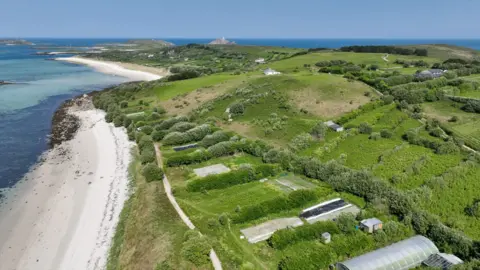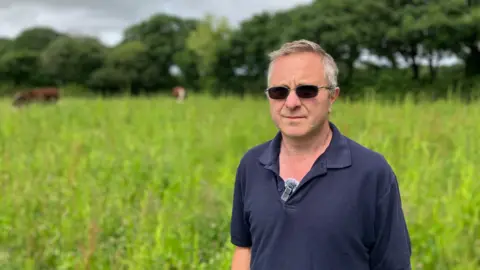Farmers 'making a change' to cut carbon emissions
 BBC
BBCA South West farmer said many in the industry were "embracing the challenge" of working more sustainably.
Jonathan Smith, who farms on the Isles of Scilly and works with other farmers and growers to reduce their carbon footprint, said "weather patterns are changing", and farmers needed to "both reduce emissions and adapt to a changing climate as well".
It follows the UK experiencing the warmest spring on record and predictions of a hotter-than-normal summer, with an increased chance for heatwaves.
The Department for Environment, Food and Rural Affairs (Defra) said it was investing £5bn into farming, adding its "commitment to farmers and growers remains steadfast."
 Scilly Organics
Scilly Organics"All the fruit, vegetables and herbs we grow are sold within the islands" said Mr Smith, who has run his organic horticultural business on St Martin's since 2003.
Mr Smith added: "We minimise the use of tractors and limit materials such as plastic. We use seaweed, compost and green manures to fertilise the fields.
"We also plant and maintain trees, hedges and an orchard to help sequester carbon and boost biodiversity."
Mr Smith said his business absorbed more carbon than it emitted.

Farm Net Zero
Andrew Brewer is a part of the Farm Net Zero project, which is working with farms across Cornwall to show the contribution agriculture makes to reducing greenhouse gas emissions.
"We used to buy a lorry load of fertiliser every month but we've not bought any now for five years. We make better use of our slurries and manure from our animals", Mr Brewer said.
He added: "We're reducing our carbon footprint significantly".
Farming is responsible for around 12% of the UK's total greenhouse gas emissions, according to the government.
The UK also has a legally-binding target, under the Climate Change Act, to be net zero by 2050.
In March 2025, concerns were raised by the National Farmers Union (NFU) over the impact of the sudden closure of the government's Sustainable Farming Initiative (SFI).
The payment scheme was put in place to encourage farmers to carry out environmental work on their land.
'Climate-smart food production'
A spokesperson for the NFU said: "The wet weather of the past two years and driest spring for a generation have had noticeable effects on farm assets and productivity, which is why we need to develop a strategic, multifunctional and coherent land use strategy focused on resource-efficient, climate-smart food production.
"Everything comes back to sufficient funding."
It added: "We need an agricultural budget which allows more farm businesses to take these important measures through the Sustainable Farming Incentive, and a nationwide flooding investment plan, which recognises rural needs, to make the UK more resilient to any extreme weather that comes our way."
'Investing record amounts'
A Defra spokesperson said: "Our commitment to farmers and growers remains steadfast.
"That's why this government is investing £5 billion into farming and has appointed former NFU president Baroness Minette Batters to recommend new reforms to boost farmers profits.
"We are also investing record amounts in flood defences and have helped secure funding for nine new reservoirs."
Follow BBC Cornwall on X, Facebook and Instagram. Send your story ideas to [email protected].
